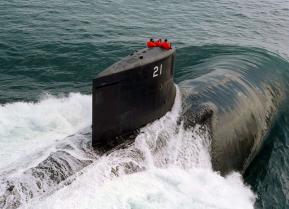The 1 Problem with the Navy's New Columbia-Class Ballistic Missile Submarine
It does not exactly make a lot of $$$ for the people who build it.
While the U.S. Navy’s forthcoming Columbia-class nuclear-powered ballistic missile submarines will be a long-term boon for the nation’s two submarine builders, the vessels might squeeze the companies’ margins in the near-term. That is not entirely unexpected because there is a learning curve for the shipyards to learn how to efficiently build new ships and submarines. Eventually, the Columbia-class production could be as efficient as Virginia-class attack submarine production.
“So think about large shipbuilding programs and businesses as typically having margins in the eight percent to 10 percent range depending on the maturity of the program,” Phebe N. Novakovic, chairman and CEO of General Dynamics, told investors on July 25.
“So that's the prism through which we should look at the Marine Group. That said, as we ramp up on Columbia, we will see some margin compression quite naturally because that will be cost plus work. And given the long duration of the shipbuilding contracts and the shipbuilding process itself for any one of these single submarines, that margin compression can obtain for a while offset, of course, by increased improvements in our Virginia class performance, which we have historically shown.”
Mike Petters, president and CEO of Huntington Ingalls, told investors that the Columbia-class has to be treated as separate program from the Virginia-class rather than a simple increase in production volume.
“I don't think you want to just turn around and say it's the same as Virginia and it's just the expansion of volume. I think that would be a misread,” Petters said.
“This is a new program and I think you need to treat it as a new program.”
Huntington Ingalls’ Newport News Shipbuilding division is partnered with General Dynamics’ famed Electric Boat division on the Columbia-class.
“The work share is a little bit different than it is on Virginia-class,” Petters said.
“We will not be delivering any of those ships whereas we deliver half of the Virginia-class programs. We will be building units and we're doing design work for those. Our scope on Virginia is about half, our scope on Columbia is less than that and we're going to be moving into a lead ship environment for ship that's really 100 percent new. And so for the next period of time next few years we're going to be in the design phase moving into construction. And we're going to be incredibly as supportive as we can be to make this program as much of a success from the gate—from the opening gate as we can.”
Novakovic said that she does not yet know how the production volume division between the Virginia-class and the Columbia-class will shake out over the coming years.
“I don't have a good estimate right now for you of the out year estimate on the mix between Virginia and Columbia,” Novakovic said.
“Columbia will, in seven or eight years, completely dwarf or heavily dwarf Virginia. So it's simply because of the volume coming into the yard. Think about it this way, we start manufacture of that first Columbia in [fiscal year 20]20 and then it will ramp up pretty expeditiously through the next four or five years.”
Recommended: Why No Commander Wants to Take On a Spike Missile
Recommended: What Will the Sixth-Generation Jet Fighter Look Like?
Recommended: Imagine a U.S. Air Force That Never Built the B-52 Bomber
Details on how the Columbia-class program will shape up will become clearer as the submarines’ design and production details are ironed out. “We signed last year a detailed design contract,” Novakovic said.
“Part of that contract is a detailed plan that we worked out with the Navy on exactly the sequencing of the requirements and the build strategy and the funding to go along with that. Once we get that ironed out in the next year and a half to two years, then we'll have quite a bit of clarity on exactly what this very long-range program looks like.”
Dave Majumdar is the defense editor for the National Interest. You can follow him on Twitter: @Davemajumdar.


